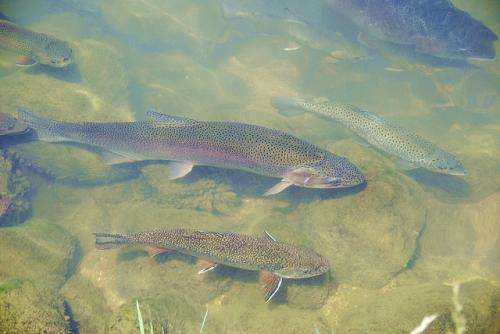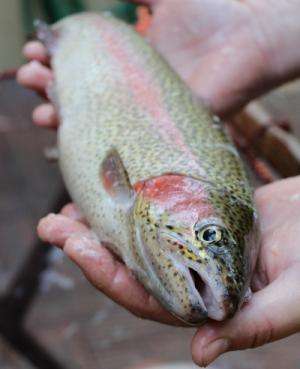Pemberton trout prove resilient to warmer waters

Department of Fisheries (DOF) scientists have found Pemberton trout (Oncorhynchus mykiss) show an increased adaptation to high temperatures compared to cold water strains.
Working with the US and Canada, they found the tolerance was a result of the trout's unique history and long-term breeding program conducted under challenging conditions in the South West.
DOF researcher Dr Michael Snow says breeding during hot summers over a period of time has led to the selective survival of fish best adapted to survive at high temperatures.
"This has been largely a result of circumstance rather than by design," he says.
"Surviving fish contribute their genes—and the physiological responses they determine—to the next generation in greater proportion, leading to progressive evolution or adaptation of the population to the changing environment.
"Trout have been continually produced at the Pemberton Hatchery for more than 50 years to support a recreational South West fishery.
"Temperatures in the South West are at the upper levels at which trout can survive and naturally breed, which has resulted in progressive selection of a genetic line of trout better able to adapt and survive in these conditions.
"This has generated a strain of trout that are of international interest because they may be better able to survive and grow in areas of the world where they once did well but are now affected by climate change."

They measured a range of responses to verify the Pemberton line of trout differs from cold water strains in their ability to physiologically adapt to increased temperatures.
This was to understand the trout's ability to maintain key physiological functions such as heart rate and oxygen-carrying capacity.
Dr Snow says the research could provide a resource that may be of interest worldwide, especially for trout aquaculture in a warming climate.
"It also helps us to understand the genes controlling adaptation so we can take a more targeted approach in the future to selecting lines of fish better suited to aquaculture," he says.
"The next stage of the research is to try to understand the genetic basis for this adaptation, linking genotype to phenotype.
"This involves an experimental design that conducts a carefully controlled breeding model to establish families of fish with limited genetic variation between them and characterising the level of physiological adaptation of each of these families."
The Pemberton trout research has being provisionally accepted for publication in the next three to six months, subject to some small changes.
Provided by Science Network WA


















